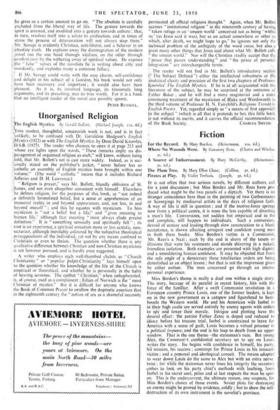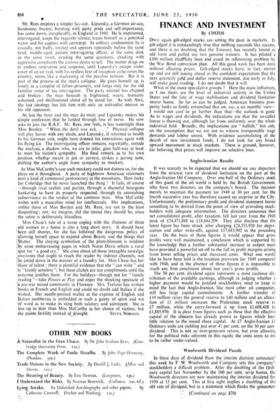Fiction
. *here No Wounds Were. By Gorenwy Rees. (Chatto and Win
9s. 6d.)
A Source of Embarrassment. By Mary McCarthy. (Heineman,:.
7s. 6d.)
The Plum Tree. By Mary Ellen Chase: (Collins. 7s. 6d.) Pirates at Play. By Violet Trefusis. • (Joseph.' 95. 6d.) IT is not often that two serious novels, by different authors, call for a joint discussion ; but Miss Borden and Mr. Rees have pro- duced what might be the two panels of a diptych. Yet there is no stranger coincidence here than in the painting of two Gethsemanes or Scourgings by mediaeval artists in the days of religious- faith. A way of life is still in question ; and if the motive-force springs now from a political centre, it is none the less capable of directing a man's life. Conversions, not sudden but empirical and in the end complete, still happen to individuals. Such a conversion, devoid of ecstasy and leading through slow renunciation to a bleak acceptance, is shown affecting arrogant and confident young men in both these books. Miss Borden's victim is a Communist, Mr. Rees's a Nazi ; each by the end is shorn of the tenets or illusions that were his vestments and stands shivering in a naked, friendless isolation. Both examples are presented with high dignity and a smouldering human sentiment. It may be objected that from the safe angle of a democracy these totalitarian orders are being demolished as an object lesson ; but that is not the impression given by either author. The men concerned go through an intense personal experience.
Miss Borden's theme is really a dual one within a single story. The story, because of its parallel in recent history, hits with the force of the farniliar. After a swift Communist revolution in a European country Prince Louis, one of the former leaders, is kept on in the new government as a catspaw and figurehead to bam- boozle the Western world. -He and his American wife Isobel in in high castle are served entirely by enemy agents with orders to spy' and lower their morale. Intrigue and plotting have the desired effect: the patriot Father Zatec is doped and reduced to idiocy before his treason trial, Isobel is constrained to leave for America with a sense of guilt, Louis becomes a virtual prisoner in a ,political impasse, and the end is his leap to death from an upper Window. That is the one theme--the statesman's ruin. But young Aleit, the Commune ;t confidential secretary set to spy on Louis, writes the story. he begins with confidence in himself, his party, lti$-mission, his success ; contempt for Prince Louis as his innocent victim ; and a personal and-ideological conceit. The means adopted to weir down-Lduis-do the same to Alex but with an extra nerve- twist ; for while the statesman never loses his integrity the secretary conies to look on his party chiefs methods with loathing, loves Isobel in his secret soul, pities and at last respects the man he spies on. This is the undercurrent, the ultimate reason, one suspects, for Miss Borden's choice of those events. Soviet plots for destroying an enemy might be proved by evidence, coldly ; but to show the self- destruction of its own instrument is the novelist's province.
Mr. Rees employs a simpler lay-out. Lipansky, a German air-ace, handsome, brazen, bursting with party pride and self-importance, has come down, inexplicably,-in England in 1940. He is imprisoned, interrogated, keeps the requisite silence, treats himself as a potential victor and his captors with contetript. In solitary confinement he is casually, not badly, treated and appears repeatedly before the same tired, middle-aged, patient interrogating officer, at the same desk in the same room, evading the same questions, cloaking with aggressive complaints the curious desire to tell. The matter drags on in endless reiteration and suspense, until Lipansky's escape under cover of an air raid, with his restless fear of recapture as he roves the country, seems like a slackening of the peculiar tension. But it is part of the process of the man's collapse. He gives himself up, is "lonely in a campful of fellow-prisoners, and longs only for the old familiar voice of his interrogator. The party enamel has chipped and broken ; the man beneath is frightened, weary, humanly ashamed, and disillusioned about all he stood for. As with Alex, the lost ideology has left him with only an unfruitful interest in his old opponent.
At last the hour and the man do meet, and Lipansky makes his Simple confession that he landed through loss of nerve. He now asks to join the R.A.F. Mr. Rees, one feels, is less watertight than Miss Borden. " When the devil was sick. . . ." Physical collapse will play havoc with any ideals, and Lipansky, if returned in health to his German unit, might have donned his convictions again with his flying kit. The interrogating officer remains, regrettably, outside the analysis, a shadow who, we are to infer, goes half-way at least to meet his victim's sympathy. His final remark as to his own , positiorr, whether meant in jest or earnest, strikes a jarring note, shifting the author's angle from sympathy to mockery.
In Miss McC,arthy's case such mockery could not distress us, for she plays on it throughout. A party of highbrow American reformers start a kind of communal pantisocracy in the mountains. How lucky for Coleridge that he never launched the thing ! It fails, of course —through rival realists and purists, through a shameful bourgeois hankering to have its property respected, through its astonishing subservience to the verdict of the common man. Miss McCarthy writes with a masculine mind for intellectuals. Her implications, unlike those of Miss Borden" and Mr. Rees, are not in the least disquieting ; nor, we imagine, did she intend they should be, since the satire is deliberately blOodless. •
Miss Chase's tale of a nurse coping with the illusions of three old women in a home is also a long short story. It should have been still shorter, for she has followed the dangerous policy of allowing herself space to expand about Beauty and the things that Matter. The cloying symbolism of the plum-blossom is outdone by some embarrassing pages in which Nurse Davis selects a rural -spot for " a good cry." She cries about all those intangible nostalgic overtones that ought to reach the reader by indirect channels, not be jotted down in the manner of a laundry list. Miss Chase has her share of talent ; there is plentiful evidence that she " can write " and is " keenly sensitive "; but these cliche's are not compliments until the outcome justifies them. For the holidays—though not for " family reading "—take Pirates at Play and enjoy the shocking spectacle of
pre-war mixed community in Florence. Mrs. Trefusis has written llooks in French and English and could no doubt add Italian if she 'wished. Her needle-pointed malice at the expense of English and :Italian snobberies is embedded in such a gaiety of spirit and wit of word as to make its sting both salutary and astringent. She is less up to date than Miss McCarthy in her choice of victims, but
she paints fertility instead of drought. SYLVA NORMAN.



































 Previous page
Previous page